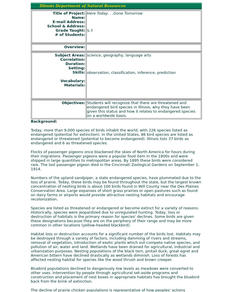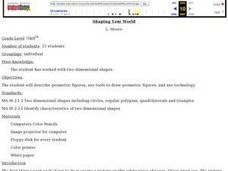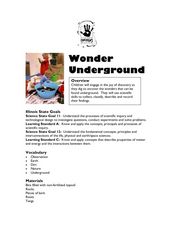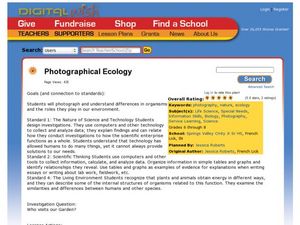Chicago Botanic Garden
Nature Walk and Ecosystem Introduction
A food web has no organism higher than a tertiary consumer because there wouldn't be enough energy left to sustain them. The fourth installment in a seven-part series begins with a nature walk to get pupils thinking about their...
ThoughtCo
Thomas Jefferson Matching Activity
What are some notable happenings that occurred during Thomas Jefferson's life and presidency? Give young historians a activity about the life and accomplishments of Thomas Jefferson.
Science 4 Inquiry
Introducing the Types of Energy
Young scientists explore many different types of energy including light, heat, nuclear, sound, potential, and more. They match the types of energy and identify when energy transfers from one type to another.
Curated OER
Butterfly 2: A Butterfly's Home
Learners determine which environmental characteristics make up a favorable butterfly habitat.
Curated OER
A Pressing Project
Students create a collection of pressed plants. In this plant lesson, students use newspaper, plywood, and a rubberband to press plants they previously collected.
Curated OER
Conservation in Small Spaces: Conservation
Pupils define conservation, identify actions that conserve habitat and those that reduce habitat, and generate ideas about how one can practice conservation in everyday life.
Curated OER
Butterfly 1: Observing the Life Cycle of a Butterfly
Students observe and identify the characteristics of the life cycle of a butterfly.
Curated OER
Crystal Growing
Students grow crystals and document their observations by recording timeing and growth. Additional characteristics of crystals are observed under a black light, by growing under different conditions and mineral content is determined.
Curated OER
How Do We Know These Beetles Are Safe to Use?
Students evaluate the impact beetles have on plants. In groups, they select plants to expose to leaf-feeding beetles and place those beetles on the caged plants. They observe the beetles and discuss the insect and plant interaction...
Curated OER
Dragonfly Sculptures
Art projects are great when they apply to other subjects. First study insects, their parts, and their habitats. Then have little ones create a dragonfly. They use clothes pins, raffia, pipe-cleaners, and paint to construct their...
Curated OER
Paper Plate Sunflowers
A great way to recall the parts of a flower is to make one. Little learners create sunflowers out of paint and paper plates. They also discuss and label the various parts of their flowers.
Curated OER
Genetically Modified Foods in Perspective
Students research the concept of genetically modified foods. The purpose of the research is to increase science content knowledge and comprehension of the controversy surrounding the subject.
Curated OER
Here Today. . .Gone Tomorrow
Students observe that there are threatened and endangered bird species in Illinois, why they have been given this status and how it relates to endangered species on a worldwide basis. they participate in the Project WILD "Oh, Deer" or...
Curated OER
Rain Forest Terrariums
Fifth graders make rain forest terrariums in order to observe a simulated mini-environment. They place the layers and plants into container and place where it can be observed. They observe the closed water system in the container before...
Curated OER
Shaping Your World
Students describe geometric figures. They create pictures and list each shape they used to create their pictures. They discuss the importance of shapes in their lives and create ten different geometric shapes using the Drawing tools in...
Curated OER
Vocab-u-lous! Build a Fabulous Vocab
In this vocabulary worksheet, students decipher the best word choice to complete the sentence. All words use Y as a vowel to build a fabulous vocabulary.
Curated OER
London Quiz 1
In this London worksheet, students answer short answer questions about the history and geography of London. Students complete 20 short answer questions.
Curated OER
Five Paragraph Essay
The components of a five-paragraph essay are outlined on these slides. Not much explanation is given, but you can use this as you lecture and help your learners write. Follow the outline for what each paragraph should contain, and...
Curated OER
New York State Mathematics Exam
In this math activity, students review for the exam given by the state of New York. There are 16 pages and 27 questions in this booklet covering topics from algebra, geometry and statistics.
Curated OER
COMPOSTING: WHY BOTHER?
Students explore the composting process and participate in a contest to make the most compost the fastest from the school's kitchen and yard waste.
Curated OER
The Greening of Mars: The Changes Necessary to Sustain Life on Mars
Fifth graders discuss the currents conditions on the planet of Mars. In groups, they work together to develop a mechanism that allows for a balanced ecosystem to survive on the planet. After presenting their ideas to the class, they...
Curated OER
Wonder Underground
Students classify and record objects they find "underground." In this observation lesson, students dig into bins filled with soil and encounter various objects such as bark, twigs, etc. Students classify their findings.
Curated OER
Growing Plants in Science and Literature, More Than an Empty Pot
Students read The Empty Pot as an introduction to plants. In this planting lesson, students understand a sequence of events in the book and relate it to the sequence of a plants life. Students grow plants and record information in flower...
Curated OER
Photographical Ecology
Learners study organisms and the roles they play in nature. In this ecology lesson, students photograph several examples of organisms during a nature walk. Learners print out their photos and classify the organisms as plants or animals.
Other popular searches
- Designing a Garden
- Garden Design Plans
- Garden Design Border
- 2nd Grade Garden Design
- Garden Design Dioramas

























